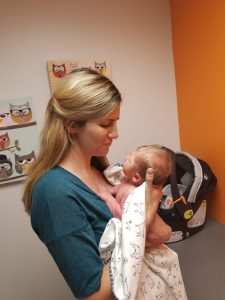As mothers, it’s a struggle to find an authentic balance between doing what feels right and doing what is expected or what society deems as “normal.” When I was pregnant with my first baby, I had been warned about how challenging breastfeeding could be. To my surprise (and relief), it just clicked. Twelve months flew by, and before I knew it, my baby was one.
 In my circle of friends (and society in general), everyone was weaning by that first birthday. This happened in a variety of ways — some couldn’t wait to be done while other babies weaned on their own. I didn’t feel the need to be done, and my daughter showed no signs of giving it up — yet I was feeling the pressure to be “normal.”
In my circle of friends (and society in general), everyone was weaning by that first birthday. This happened in a variety of ways — some couldn’t wait to be done while other babies weaned on their own. I didn’t feel the need to be done, and my daughter showed no signs of giving it up — yet I was feeling the pressure to be “normal.”
A friend of mine (who happened to be childless) questioned why I was thinking of weaning when I didn’t feel that it was time. Until then, it truly hadn’t occurred to me that it was a personal choice for ME to make. My friend’s mother was a lactation consultant, so this friend was naturally breastfeeding positive. In that conversation, she gave me the gift of permission I somehow thought I needed to do what felt right for my baby and I. Why do we feel like we need permission as mothers?
According to KellyMom, the American Academy of Family Physicians states that “As recommended by the WHO (World Health Organization), breastfeeding should ideally continue beyond infancy, but this is not the cultural norm in the United States and requires ongoing support and encouragement. It has been estimated that a natural weaning age for humans is between two and seven years. Family physicians should be knowledgeable regarding the ongoing benefits to the child of extended breastfeeding.” (AAFP 2008)
The two points that stuck out to me were the need for ongoing support and encouragement as well as the importance of doctors being knowledgeable on the topic. Surprisingly, or maybe not-so-surprisingly, a wide range of Facebook groups provided a huge support outlet for me through this journey.
I suddenly felt like a fish out of water nursing past one, but in these extended nursing groups, I felt like I was normal. The pride these moms had was inspiring to me. I was also fortunate to have a handful of friends who voiced their support — either through words or nursing beyond infancy themselves. Our pediatrician was neutral — and that bothered me. I think sometimes I wanted a pat on the back for what I was doing, and I never got that. However, the lack of consistent affirmation was a good form of therapy for me in its own way — doing what I felt was best as a mother without outside authority nodding her head in approval.
In Western countries such as the United States, Canada, and the United Kingdom, extended breastfeeding is not the norm. According to the Journal of Tropical Pediatrics, it is challenging to gather accurate information and statistics about extended breastfeeding in these particular countries because of mothers’ embarrassment or secrecy. Moms who choose to continue nursing often will hide it from friends or family — how sad is this? It continues to intrigue me that something so private between a mother and child is somehow everyone else’s business or concern.
I decided that summer after my daughter turned one that I would do the brave and societally “questionable” thing and continue nursing. I refused to allow my desire to somehow please others to dictate the end of that relationship. It was one of the best decisions I’ve ever made.
 If you are on the fence about foregoing the weaning process, this little pep talk is for you. Listen to your gut. All that matters is a happy and healthy mom and child. Don’t let the reason for quitting be anything outside of what is best for the two of you. I have told myself many times that this won’t be the first time in parenting where I choose a path different from others, and that’s OK. I would encourage you to find a group for support, whether that be locally or on social media outlets. Find those friends or family members who will encourage you without judgment, even if they don’t understand it themselves.
If you are on the fence about foregoing the weaning process, this little pep talk is for you. Listen to your gut. All that matters is a happy and healthy mom and child. Don’t let the reason for quitting be anything outside of what is best for the two of you. I have told myself many times that this won’t be the first time in parenting where I choose a path different from others, and that’s OK. I would encourage you to find a group for support, whether that be locally or on social media outlets. Find those friends or family members who will encourage you without judgment, even if they don’t understand it themselves.
And lastly, you are the one who was chosen to be your baby’s mom — never forget that. You get to make the decisions. No permission needed.
















